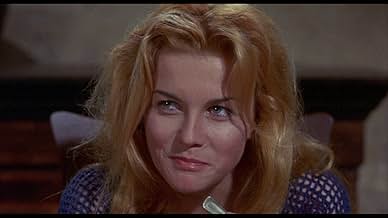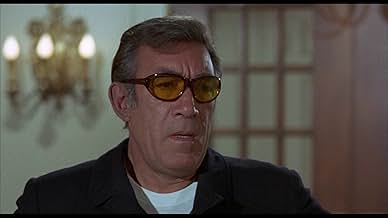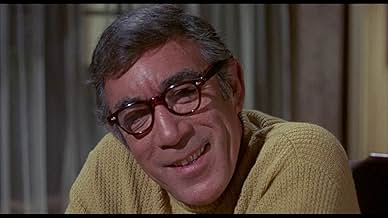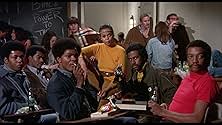R.P.M. stands for (political) revolutions per minute. Anthony Quinn plays a liberal college professor at a west coast college during the heady days of campus activism in the late 1960's. Rad... Read allR.P.M. stands for (political) revolutions per minute. Anthony Quinn plays a liberal college professor at a west coast college during the heady days of campus activism in the late 1960's. Radical students take over the college, the president resigns, and Quinn's character, who has... Read allR.P.M. stands for (political) revolutions per minute. Anthony Quinn plays a liberal college professor at a west coast college during the heady days of campus activism in the late 1960's. Radical students take over the college, the president resigns, and Quinn's character, who has always been a champion of student activism, is appointed president.
- Estella
- (as Ines Pedroza)
- Director
- Writer
- All cast & crew
- Production, box office & more at IMDbPro
Featured reviews
Leader of a student group taking over a university's computer center, Lockwood... along with another thirty-something student Paul Winfield... have demands they give to a liberal professor they once really liked...
That's where star Anthony Quinn, hired as a kind of emergency dean/president, comes in: spending most of the picture either having long discussions with comparably stuffy and conservative university profs or hanging out with young girlfriend Ann-Margret, who, like Lockwood, has little to do here but spout smug counter-culture platitudes in what feels more like a progressive TV-movie than a watered-down big-screen expose of college revolutionaries (very timely here in 2024), hence the R. P. M. Title standing for Revolutions Per Minute...
But there's only one revolution here, and it drags, despite Lockwood having a few good monologues opening up to Quinn... yet the audience can never fully get into his shared plight/agenda since otherwise sympathetic left-wing director and scriptwriter Stanley Kramer and Erich Segal never properly flesh-out the characters to grow past clichés - on either side of the aisle.
Woodstock was in August of 1969. Altamont was in December of 1969. This means that the Woodstock Nation lasted barely four months. Elizabeth Taylor has kept husbands longer than that.
What the major studios did was get mainstream directors and told them make movies about youth in revolt. The result was movies like this which were very expensive imitations of movies that American-International had made in the sixties on nonexistent budgets.
RPM is watchable for a fine performance by Anthony Quinn. Lord, but he's a trooper. The script was obsolete before the ink dried on it. I'll be generous and say that Eric Segal's screenplay stinks. Of course, forty years later LOVE STORY doesn't get all that much love anyway.
The story centers on a Sociology professor who is picked to be president of a fictional college after protesting students occupy the administration building. The board has a late night meeting and decides to appoint Quinn president based primarily on the fact that he's sleeping with a graduate student in his department who is young enough to be his daughter.
Imagine trying to sell that to a major studio in today's Politically Correct world. Ann-Margret plays the graduate student and recognizes the script to be crap, so she has fun playing this airhead and wears ridiculous costumes and, in one scene, talks with while chewing food so that audiences won't have to understand the words she's saying.
Incredibly, this is directed by Stanley Kramer. Kramer had become a legend directing films like THE DEFIANT ONES, INHERIT THE WIND, SHIP OF FOOLS, JUDGMENT AT NUREMBERG, and GUESS WHO'S COMING TO DINNER, all of which dealt with Big Ideas from a socially progressive point of view. More importantly, they were full of characters that audiences could identify with and were fully realized human beings.
RPM is like a pageant put on by a community college Sociology department. Characters represent Sexual Freedom, Corporate Apathy, Prejudice, Sexual Liberation, Black Power, etc.
At its peak, the student revolution actually appealed to a very small per cent of students and had little support from the mainstream community. Worse yet, this film was released in the middle of Nixon's first term of office. Youthful idealism faded as more students pursued graduate studies in Business Administration.
Thanks to Turner Classic Movies for running this. I'd heard of it, but figured that Columbia Pictures had destroyed all the existing prints hoping nobody would remember it. Somehow TCM found a pristine print in excellent condition. It would have gotten just one out of ten, but I had to recognize Quinn's excellent work trying to make a dead horse run.
But here's the insulting part of the film, why dear vibrant, sexy Tony should never have taken the part: he's shown as over-the-hill and unable to relate to the wild generation. He wears reading glasses, he takes terrible insults from the students, and his girlfriend tells him "Pull in your gut" when he walks around naked. (Sorry ladies, he's given a flesh-colored thong to protect his modesty.) One could argue that he's still young and hip enough to go to bed with Ann-Margret, but as the movie progresses, the students are so disrespectful, they show the real generation gap: manners and decency. Even though Tony doesn't agree with the kids, he still tries to treat them with respect, but the angry, protesting teenagers don't give him the same courtesy.
There will be a large chunk of audience members who side with the teenagers, and that makes me both sad and disgusted. Manners never go out of style, and using them doesn't show weakness or inflexibility. It shows class, the ability to see the bigger picture, and maturity. Tony may belong to the older generation with graying hair and a growing tummy, but I'll happily join him any day of the week.
In a conversation on the stairwell toward the end of the film, Anthony Quinn and Gary Lockwood discuss change, indicating that nothing happened between Quinn's and Lockwood's respective generations. Nothing has happened in the two generations that followed, i.e. 1990 and 2010.
The sad fact is that society has degenerated. I graduated from a very liberal Big Ten school in 1962 and we didn't have campus unrest. After that, I began a successful career which was interrupted by the draft and a tour in Vietnam. I returned to work and became even more successful because I worked smart and hard. The draft saved me and I wish the draft would have never ended, although I think the Vietnam war was futile. Young men need military service to GROW UP! As for Ann Margaret, she always played sexy but never nude, except for her role in 'Carnal Knowledge' where viewers experienced her large arse.
Despite Ann's frivolous on-screen characters (I wonder how she was in private life) this was a film that predicts the future, as in...'Oh yah, life goes on, long after the thrill of living is gone.' (John Mellancamp).
Did you know
- TriviaStanley Kramer always referred to this film in interviews as his least favorite and least successful of the films he has directed.
- Quotes
Prof. F.W.J. 'Paco' Perez: "Lickety split"? Where do you get your vocabulary?
- Crazy creditsAs the opening credits roll, the screen flips like a coin-like wipe with the text appearing in the center of the "coin".
- ConnectionsFeatured in Two Sides of the Coin: The Songs and Music of 'R.P.M.' (2019)
- SoundtracksStop! I Don't Wanna' Hear It Anymore
Written by Barry De Vorzon & Perry Botkin Jr.
Additional lyrics by Melanie
Performed by Melanie
Courtesy of Buddah Records
- How long is R.P.M.?Powered by Alexa
Details
- Release date
- Country of origin
- Language
- Also known as
- R.P.M. */* Revolutions per minute
- Filming locations
- Pacific Avenue Bowl, Stockton, CA, USA(Exterior)
- Production company
- See more company credits at IMDbPro
- Runtime1 hour 32 minutes
- Sound mix
- Aspect ratio
- 1.85 : 1
Contribute to this page































